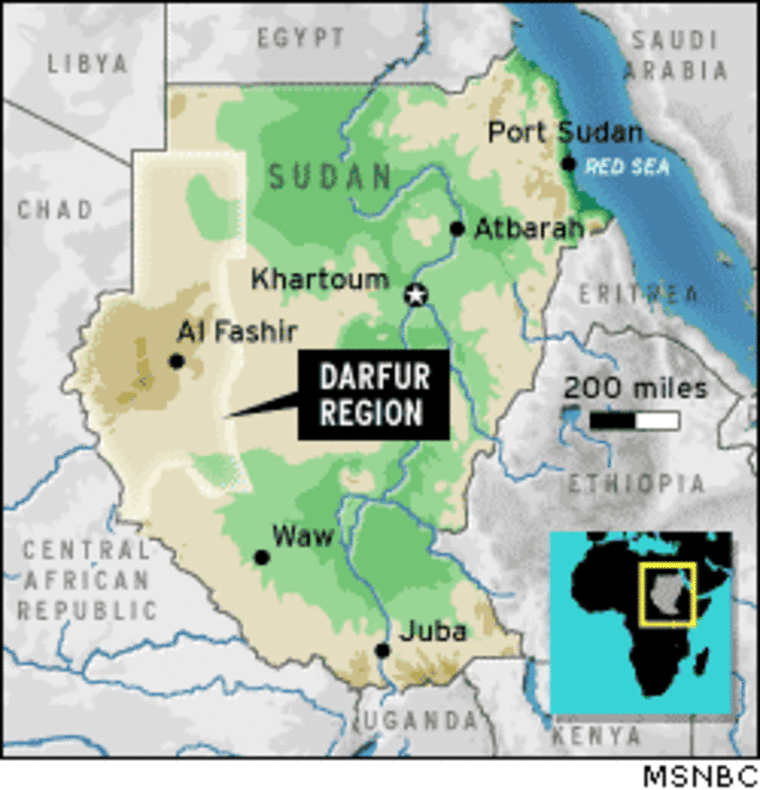Violence in Sudan’s troubled Darfur region will spread if a U.N. peacekeeping mission replaces a beleaguered African Union force, a senior Sudanese government official warned Wednesday.
Sudan has sent envoys to several African countries to lobby against the proposed takeover ahead of a meeting Friday of the African Union’s Peace and Security Council to discuss Darfur, said Mohamed Elsamani, Sudan’s minister of state for foreign affairs.
A political solution rather than a handover to the United Nations is the only way to end the three-year rebellion, Elsamani said at a news conference.
“If the U.N. arrives the troubles will spread in the region,” he said.
See U.N. as invaders
In the Sudanese capital Wednesday, a huge, peaceful demonstration against the U.N. peacekeepers proposal brought downtown Khartoum to a standstill.
“Even if they send pure Muslim or Arab troops we will consider them invaders and will fight them,” Fatahi Khalil, the dean of the Sudanese Bar Association and secretary of the Popular Organization for the Defense of the Homeland and the Faith, told cheering crowds after handing over a memorandum of protest to U.N. officials in Sudan.
The protesters also called for the expulsion of Jan Pronk, the special U.N. envoy to Sudan, and of the top U.S. diplomat in Sudan. The United States has pushed for the deployment of U.N. peacekeepers in Darfur.
Elsamani met with Kenyan President Mwai Kibaki in Nairobi early Wednesday and is expected to go to South Africa, Lesotho and Mozambique with a similar message. Other Sudanese envoys have been sent to west African countries.
“Our position is that the AU has got no right to transfer the mission without taking the permission of Sudan,” Elsamani said. “It is not a process that will be accepted in Sudan.”

AU force has been hamstrung
The AU force’s mandate expires at the end of March. On Feb. 3, the U.N. Security Council authorized planning for the United Nations takeover.
The AU mission has been hampered by a shortage of funds, troops and equipment and its mandate has been limited to monitoring an April 2004 cease-fire that is regularly broken by all parties and offers limited protection to civilians.
Decades of low-level tribal clashes over land and water in Sudan’s vast western region of Darfur erupted into large-scale violence in February 2003 when ethnic African tribes took up arms, accusing the Arab-dominated central government of neglect. Some 180,000 people have died in the upheaval, mainly from disease and hunger, and 2 million have been displaced.
The Sudanese government is widely alleged to have unleashed Arab militias who carried out sweeping atrocities against ethnic African villagers. Sudanese President Omar el-Bashir denies his government supports the militia, known as Janjaweed.
Elsamani said the United Nations had been tainted, citing its failure to prevent the war in Iraq and the “bad conduct” of its peacekeepers in other missions. He also cited the human rights record of members states, singling out the United States because of its treatment of prisoners at the detention camp for terror suspects at Guantanamo Bay, Cuba.
Looking for an end to the conflict
His comments came as top EU and U.S. officials met with Sudanese, African and U.N. officials in Brussels, Belgium, to boost efforts to bring the conflict to an end.
EU foreign policy chief Javier Solana, who was hosting the talks, said the meeting would explore “how we can help organize the transfer” to the U.N. peacekeeping mission.
Elsamani called on African leaders to provide greater support to prevent the AU mission from being branded a failure and hampering any future peacekeeping work it undertakes.